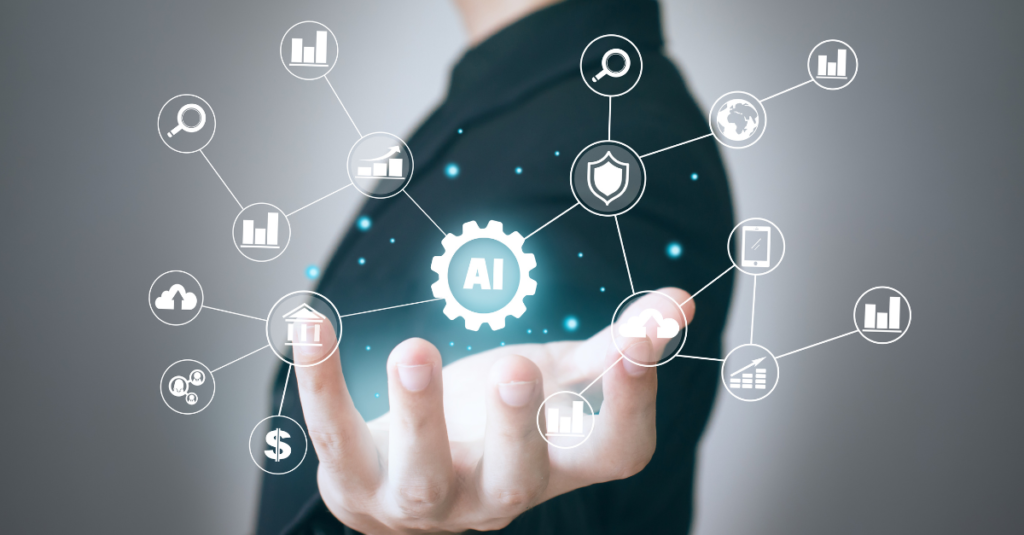
Are you looking for ways to enhance your marketing strategies and connect with your customers on a more personalized level? Personalized marketing with AI is the solution you need. By harnessing the power of AI technology, businesses can create tailored marketing campaigns that drive better engagement, increase conversions, and ultimately boost their bottom line.
AI-powered personalized marketing offers a range of solutions and strategies to help you deliver highly targeted content and offers to your customers. With AI-driven automation, you can analyze customer data, predict their preferences, and tailor your messaging to their unique needs and interests. Whether you’re a small business or a multinational corporation, personalized marketing tactics powered by AI can give you the competitive edge you’re looking for.
Imagine being able to create customized marketing campaigns that speak directly to your customers, offering them products and services they’re truly interested in. This level of personalization not only enhances their experience but also increases the chances of them converting into loyal customers.
- The Role of AI in Personalized Marketing
- Benefits of AI in Personalized Marketing
- How AI Analyzes Customer Data and Behavior in Personalized Marketing
- Examples of Successful Personalized Marketing Campaigns Using AI
- The Ethical Implications of Using AI in Personalized Marketing
- Ensuring Responsible Use of AI in Marketing
- AI-Powered Tools for Email Marketing
- AI-Powered Tools for Personalized Marketing
- Conclusion
- FAQ
The Role of AI in Personalized Marketing
When it comes to personalized marketing, AI plays a crucial role in creating tailored experiences for customers. By leveraging AI algorithms, businesses can analyze vast amounts of customer data, allowing them to understand customer behavior and preferences on a deeper level.
AI algorithms are capable of processing and analyzing customer data, enabling businesses to identify patterns and make predictions about customer behavior. This data analysis is essential for creating personalized messaging, product recommendations, and targeted ads that resonate with individual customers.
With the help of AI-powered tools, marketers can automate and scale their marketing efforts. These tools optimize campaigns in real-time, ensuring that the right message reaches the right customer at the right time. By harnessing the power of AI, businesses can improve customer satisfaction and loyalty by delivering personalized experiences that meet their individual needs.
One area where AI proves particularly valuable is email marketing. AI-powered technology can analyze customer sentiment and feedback, allowing businesses to optimize their email campaigns and respond to customer needs effectively.
The integration of AI in personalized marketing allows businesses to create more engaging, relevant, and personalized experiences for their customers. Whether it’s customizing product recommendations or tailoring messaging, AI enables businesses to connect with customers on a more personal level, ultimately driving better results.
AI algorithms analyze vast amounts of customer data to create tailored experiences at scale.
By leveraging AI in personalized marketing, businesses can:
- Process and analyze customer data to gain insights into behavior and preferences
- Create personalized messaging, product recommendations, and targeted ads
- Automate and scale marketing efforts, optimizing campaigns in real-time
- Improve customer satisfaction and loyalty with personalized experiences
Overall, the role of AI in personalized marketing is pivotal. It enables businesses to navigate through vast volumes of data and deliver personalized experiences that engage customers on a deeper level. By leveraging AI algorithms, businesses can enhance their marketing strategies, creating more meaningful connections and driving better business outcomes.
Benefits of AI in Personalized Marketing
Using artificial intelligence (AI) in personalized marketing offers numerous benefits that can significantly enhance your marketing strategies and outcomes.
One of the key advantages of AI is its ability to quickly and accurately analyze large amounts of data. Through advanced data analysis techniques, AI algorithms can identify patterns, trends, and correlations within your customer data, enabling you to create personalized and relevant marketing content.
With AI-powered personalization, you can provide tailored experiences and recommendations based on individual customer preferences, behavior, and demographics. By understanding your customers on a deeper level, you can deliver highly targeted messaging, product suggestions, and offers that resonate with their unique needs and desires.

In addition to personalization, AI can also automate and scale your marketing efforts, saving you valuable time and resources. By automating tasks such as data analysis, segmentation, and content creation, you can streamline your marketing processes and improve efficiency.
Predictive analytics, powered by AI, empowers you to forecast customer behavior, optimize campaigns in real-time, and make data-driven decisions. By leveraging AI’s ability to analyze historical data and identify patterns, you can gain valuable insights that inform your marketing strategies and drive better results.
Overall, AI in personalized marketing enhances your efficiency, improves customer satisfaction and engagement, and delivers better business outcomes. By leveraging the power of AI, you can unlock the full potential of your marketing efforts and stay ahead in today’s highly competitive landscape.
Related Post: The Ultimate Guide to the Best AI Marketing Tools for Business Growth in 2024
How AI Analyzes Customer Data and Behavior in Personalized Marketing
AI plays a crucial role in personalized marketing by utilizing advanced algorithms to analyze vast amounts of customer data and gain valuable insights into their preferences and behavior. By processing various data points such as demographic information, purchase history, browsing behavior, and social media activity, AI algorithms can create comprehensive customer profiles and predict future behavior.
Through data analysis, AI-powered tools can identify patterns and trends, enabling businesses to segment their customers based on their behavior and preferences. This segmentation allows for more targeted and personalized marketing efforts, ensuring that each customer receives content and offers that align with their interests.
The analysis of customer data and behavior by AI provides businesses with valuable insights that can inform their marketing strategies. By understanding customer preferences, businesses can create personalized marketing experiences, tailored messaging, and targeted advertising campaigns that resonate with their audience.
One example of the AI-driven analysis of customer behavior is the use of machine learning algorithms to predict customer churn. By identifying patterns in past customer behavior and engagement, AI can provide insights and help businesses implement retention strategies to reduce customer churn rates.

AI algorithms can also assist businesses in predicting and understanding customer preferences, leading to personalized product recommendations and customized offers. By leveraging AI data analysis, businesses can enhance their understanding of customer needs and preferences, resulting in improved customer satisfaction and increased engagement.
- AI analyzes various data points, including demographic information, purchase history, browsing behavior, and social media activity, to gain insights into customer preferences and behavior.
- By recognizing patterns and trends, AI algorithms create comprehensive customer profiles and predict future behavior.
- AI-powered tools enable businesses to segment customers based on their behavior and preferences, allowing for targeted and personalized marketing efforts.
- The analysis of customer data and behavior by AI provides valuable insights that inform marketing strategies.
In conclusion, AI data analysis and customer behavior analysis are essential components of personalized marketing. By leveraging AI-powered tools and algorithms, businesses can gain valuable insights into their customers, enhance their understanding of customer preferences, and deliver personalized marketing experiences that drive engagement and improve business outcomes.
Examples of Successful Personalized Marketing Campaigns Using AI
Several companies have successfully leveraged the power of AI in their personalized marketing campaigns, resulting in improved customer experiences and increased engagement. These successful examples demonstrate the effectiveness of AI in creating personalized marketing experiences that resonate with customers, leading to higher levels of engagement, sales, and customer loyalty.
Spotify: Personalized Playlists Based on Listening Habits
Spotify, the popular music streaming platform, utilizes AI algorithms to create personalized playlists for its users. By analyzing users’ listening habits, AI technology generates customized playlists that align with their musical preferences. This personalization not only enhances the user experience but also keeps users engaged with the platform, increasing customer retention and satisfaction.
Amazon and Netflix: AI-Powered Relevant Recommendations
E-commerce giant Amazon and streaming service Netflix have mastered the art of AI-driven personalized recommendations. By employing sophisticated AI algorithms, these companies analyze vast amounts of customer data, such as purchase history, browsing behavior, and previous interactions, to suggest relevant products and content. This tailored approach enhances the customer experience, increases the likelihood of purchases, and keeps customers engaged and returning for more.
Sephora: AI-Powered Virtual Try-On Technology
Sephora, the renowned beauty retailer, integrates AI-powered virtual try-on technology into its marketing strategy. By leveraging AI algorithms, Sephora enables customers to virtually try on different makeup products, allowing them to find the perfect match before making a purchase. This personalized approach not only enhances customer satisfaction but also reduces the number of returns, ultimately boosting sales and customer loyalty.

These examples of successful personalized marketing campaigns powered by AI highlight the immense potential of AI technology in creating tailored and engaging experiences for customers. By utilizing AI algorithms, businesses can deliver highly personalized content, recommendations, and virtual experiences that resonate with their target audience, resulting in increased engagement, sales, and customer loyalty.
The Ethical Implications of Using AI in Personalized Marketing
While AI offers numerous benefits in the realm of personalized marketing, it is essential to consider the ethical implications that come along with its use. These implications span various areas, including privacy concerns, bias, transparency, and unintended consequences.
Privacy concerns are a significant consideration when leveraging AI in personalized marketing. The collection and utilization of customer data raise questions about data privacy and security. Companies must prioritize protecting individuals’ personal information and ensure that they are compliant with privacy regulations.
Bias is another ethical concern associated with AI algorithms in personalized marketing. AI algorithms can inadvertently exhibit bias, leading to discriminatory outcomes. It is crucial for organizations to address bias mitigation strategies and ensure fairness and equality in marketing practices.
Transparency is paramount in AI-driven personalized marketing. Lack of transparency in AI algorithms and decision-making processes can erode trust between companies and customers. It is vital for businesses to be transparent about how AI is being used, the data being collected, and the reasoning behind personalized marketing decisions.
Unintended consequences can arise when AI algorithms make mistakes or generate negative reactions from customers. These consequences could include delivering inappropriate or irrelevant content, resulting in customer dissatisfaction and potential reputational damage. Businesses must be vigilant in monitoring AI systems and promptly address any unintended consequences.
Ultimately, it is crucial for companies to ensure the responsible and ethical use of AI in personalized marketing. By addressing privacy concerns, mitigating bias, prioritizing transparency, and monitoring and mitigating unintended consequences, businesses can foster trust, maintain customer satisfaction, and uphold ethical standards in their marketing practices.
Ensuring Responsible Use of AI in Marketing
When implementing AI in marketing strategies, it is crucial for companies to prioritize responsible and ethical practices to build customer trust and avoid unintended consequences. Here are some key considerations to ensure responsible use of AI in marketing:
Transparency in Data Usage and Storage
One of the most important aspects of responsible AI use in marketing is transparency. Companies should provide clear explanations to customers on how their data is collected, used, and stored. By being transparent, businesses can build trust and reassure customers that their information is being handled responsibly.
Mitigating Bias and Discrimination
Bias in AI algorithms can lead to discriminatory outcomes. It is essential for companies to monitor for bias and take measures to mitigate it. Regularly assessing and updating algorithms can help minimize bias and ensure fair and inclusive marketing practices.
Involving Customers in Decision-Making
Empowering customers by involving them in the decision-making process can foster trust and ensure their preferences are respected. Seeking customer consent and feedback can help businesses tailor their marketing efforts more effectively and address any concerns or issues that may arise.
By approaching AI with a responsible and ethical mindset, businesses can create personalized marketing experiences that are effective, trustworthy, and respectful of customer privacy. Prioritizing transparency, mitigating bias, and involving customers in the decision-making process are key steps to building customer trust and ensuring the responsible use of AI in marketing.
Related Post: The Best AI-Powered Sales Tools for Optimizing Revenue
AI-Powered Tools for Email Marketing
AI-powered tools have revolutionized email marketing campaigns, providing businesses with advanced capabilities to enhance their strategies. By harnessing the power of AI, these tools enable data analysis, personalization, sentiment analysis, and workflow optimization to optimize email marketing efforts.
One of the key benefits of AI in email marketing is the ability to analyze customer data. AI-powered tools can analyze vast amounts of customer information, such as preferences, demographics, and behavior, to create personalized emails and promotional materials. By tailoring the content to individual recipients, businesses can significantly improve engagement and conversion rates.
AI tools also excel in automating segmentation, an essential aspect of effective email marketing. By analyzing customer behavior, AI algorithms can automatically categorize subscribers into different segments, ensuring that each email is sent to the most relevant audience. This optimization of segmentation improves the overall effectiveness of email campaigns.
With predictive analytics, AI-powered tools help businesses optimize their email campaigns by making data-driven decisions. By analyzing past campaign performance and customer behavior, these tools can provide insights and recommendations on timing, content, and targeting. This optimization process ensures that businesses can continually refine their email marketing strategies for better results.
Sentiment analysis is another powerful capability offered by AI tools in email marketing. By monitoring customer sentiment through advanced algorithms, businesses can gauge the effectiveness of their email campaigns. This analysis allows marketers to improve subject lines, identify relevant content, and make adjustments to better resonate with their audience.
Workflow optimization is a critical aspect of efficient email marketing processes, and AI-powered tools excel in this area as well. By automating repetitive tasks and streamlining workflows, businesses can save time and effort, allowing their marketing teams to focus on more strategic initiatives. This optimization improves overall efficiency and effectiveness in executing email marketing campaigns.
Overall, AI-powered tools have transformed email marketing by enabling data analysis, personalization, sentiment analysis, and workflow optimization. These capabilities empower businesses to create highly targeted and personalized emails, leading to improved engagement, higher conversion rates, and better business outcomes. With AI-driven tools, email marketing campaigns become more efficient, effective, and tailored to the needs and preferences of each individual recipient.
AI-Powered Tools for Personalized Marketing
With the advancement of AI technology, personalized marketing has reached new heights. AI-powered marketing tools such as Hubspot’s Content Assistant, Jasper, and ChatGPT are transforming the way businesses engage with their audience. These tools are designed to generate personalized content, automate workflows, and optimize email campaigns, resulting in improved efficiency and enhanced engagement.
Generating Personalized Content
AI-powered marketing tools assist in generating highly targeted and personalized content for every stage of the customer journey. By analyzing customer data and behavior, these tools can create tailored messages, offers, and recommendations that resonate with individual preferences and interests. This level of personalization significantly improves the effectiveness of marketing campaigns, leading to higher engagement and better conversion rates.
Automating Workflows
Efficiency is key in personalized marketing, and AI-powered tools streamline workflows by automating repetitive tasks. With AI automation, marketers can save time and energy, allowing them to focus on strategy and creativity. By automating processes such as data analysis, customer segmentation, and content creation, marketing teams can maximize their productivity and achieve better results in less time.
Optimizing Email Campaigns
Email marketing remains a powerful tool in customer engagement, and AI-powered tools take it to the next level. These tools harness the power of AI algorithms to optimize every aspect of email campaigns, from subject lines and content to delivery timing. By analyzing customer data and behavior, AI can predict the most effective content and timing for each individual, resulting in higher click-through rates and improved campaign performance.
By leveraging AI-powered marketing tools, businesses can unlock the full potential of personalized marketing. These tools improve efficiency, enhance engagement, and increase click-through rates, leading to better user experiences and improved business outcomes. As AI technology continues to advance, the possibilities for personalized marketing are limitless.
Conclusion
Personalized marketing with AI revolutionizes the way businesses engage with their customers. By leveraging AI algorithms, companies can effectively analyze massive volumes of customer data, enabling them to deliver tailored content, optimize campaigns, and streamline processes. The result is improved customer engagement, higher conversion rates, and enhanced business performance.
As AI technology continues to evolve, it will play an increasingly vital role in creating personalized marketing strategies. With AI-driven solutions, businesses can scale their creativity and strategy, delivering relevant and innovative experiences at scale. By harnessing the power of AI, companies can gain a competitive edge, drive better business results, and maximize customer engagement.
Personalized marketing with AI offers a wealth of benefits, including efficient data analysis, precise segmentation, predictive analytics, and improved efficiency. AI-powered tools empower marketers to make data-driven decisions, deliver personalized experiences, and optimize email marketing campaigns. With AI in their toolkit, businesses can enhance customer satisfaction, build brand loyalty, and achieve long-term success in the dynamic world of marketing.
Related Post: Top AI Finance Tools and Solutions for 2024
FAQ
What is personalized marketing with AI?
Personalized marketing with AI is a strategy that uses artificial intelligence to target individual customers with tailored messages, offers, and recommendations based on their interests, behavior, and demographics.
How does AI play a role in personalized marketing?
AI plays a crucial role in personalized marketing by analyzing vast amounts of customer data, creating customized experiences at scale, and automating and optimizing marketing efforts in real-time.
What are the benefits of using AI in personalized marketing?
The benefits of using AI in personalized marketing include quick and accurate analysis of data, personalized and relevant marketing content, automation and scalability of marketing efforts, predictive analytics, and improved efficiency, customer satisfaction, and engagement.
How does AI analyze customer data and behavior in personalized marketing?
AI algorithms analyze customer data points such as demographics, purchase history, browsing behavior, and social media activity to gain insights into preferences and behavior, create customer profiles, and predict future behavior for more targeted and personalized marketing efforts.
Can you provide examples of successful personalized marketing campaigns using AI?
Yes, companies like Spotify, Amazon, Netflix, and Sephora have successfully used AI in their personalized marketing campaigns to improve customer experiences, increase engagement, and drive sales and loyalty.
What are the ethical implications of using AI in personalized marketing?
The ethical implications include privacy concerns, potential bias and discrimination in AI algorithms, lack of transparency, and unintended consequences that could erode trust between companies and customers.
How can companies ensure the responsible use of AI in marketing?
Companies can prioritize transparency in how customer data is used and stored, monitor for bias and discrimination, involve customers in decision-making, and approach AI with a responsible and ethical mindset to create personalized experiences that are effective, trustworthy, and respect customer privacy.
What are AI-powered tools for email marketing?
AI-powered tools like Hubspot’s Content Assistant, Jasper, and ChatGPT can analyze customer data, automate segmentation, optimize email campaigns, and enhance efficiency and effectiveness in email marketing.
What are AI-powered tools for personalized marketing?
AI-powered tools like Hubspot’s Content Assistant, Jasper, and ChatGPT can generate personalized content, automate workflows, optimize campaigns, and improve user engagement and click-through rates in personalized marketing.
How does personalized marketing with AI boost engagement?
Personalized marketing with AI enables businesses to create tailored, targeted, and engaging marketing experiences for customers by analyzing data, personalizing content, optimizing campaigns, and automating processes, resulting in improved customer engagement, higher conversion rates, and enhanced business results.

